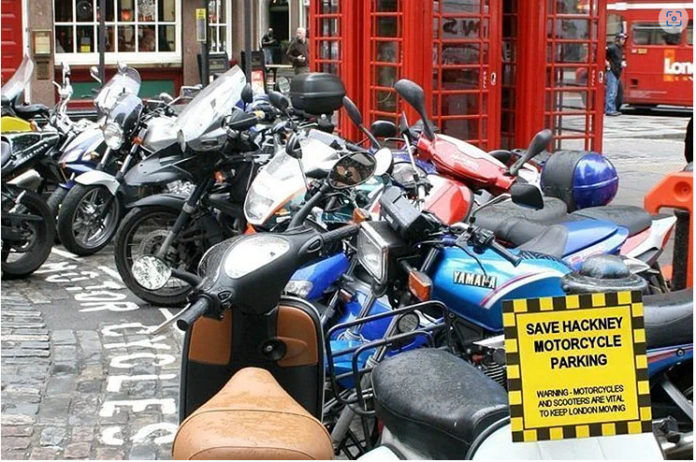Protesters presented Hackney council with 7,800 signed petitions in order to prevent Hackney’s proposed transport charge that they say will cost motorcyclists and scooter riders thousands of pounds a year to travel to the borough for work.
If the plans are to be implemented, workers and carers would have to spend £14,000 per year to travel in Hackney, which might lead to increased car usage and pollution, they say.
At the presentation of the petition to Hackney Council, dozens of protesters, who called the proposed charges “transport poverty tax”, made their voices heard.
The petition, signed by some individuals, expressed opposition to the council’s plan to impose a parking charge of £10 a day that will have to be paid by carers, key workers, and others who use powered two-wheeled vehicles like scooters and motorcycles to travel to work in Hackney.
Karen Neil, Britain’s biking hero and a North London businesswoman, criticised Hackney council’s proposal to charge people for using powered two-wheeled vehicles based on their emissions at a press conference at the end of April.
Neil presented evidence to support her claim that the plan was flawed, such as the fact that electric cars and motorcycles would be subject to the same fees.
She continued by highlighting the fact that riders care about the environment and are ready to assist the council in achieving its objectives by promoting the advantages of motorcycles and scooters for all residents of Hackney.
Motorcycles and scooters are important components of urban mobility since they do not cause congestion and take up less parking space, while emitting four times less NO2 per mile than cars.
Katie, a small business owner in Hackney said: “The impact of the charges will be entirely negative to me, my business and Hackney itself. I am asking you as Hackney business owners, as someone who cares about Hackney to please reconsider these regressive charges.”
The council has repeatedly refused to consider the effect of motorcycles on air quality improvement and the reduction of kerbside parking space, instead asserting that the proposed fees are intended to address these issues. This refusal has occurred despite numerous attempts to provide credible evidence via numerous channels.
Hackney Council sticks to the plan
Philip Glanville, the Mayor of Hackney, responded to the petitioners that their concerns were heard during the consultation process. He did not comment on the fact that the proposal from the council was opposed by a large majority of respondents, including 80% of all participants and 97% of powered two-wheeled riders.
Green Party Councillor Binnie-Lubbock proposed a review of the evidence that had been presented to support the council’s decision during the press conference of Hackney Council’s proposed charges. Glanville and his team’s justification for the tax, in the words of Councillor Binnie-Lubbock, had been “utterly bogus and false.”
The proposal to review the evidence was seconded by the Green Party and received support from Conservative councillors, but it was ultimately defeated by Labour councillors.
Opposition parties and the general public criticised this choice, saying it was unjustifiable and disregarded community concerns and available evidence. Despite the vote, discussions about the council’s strategy for combating pollution and improving the area’s air quality remained fuelled by the controversy surrounding the proposed tax.
A spokesperson for Save London Motorcycling said: “We were utterly shocked that the Council voted down a motion to review the evidence, despite both opposition parties with one voice urging them to see sense.
“This is clearly indicative of Hackney council’s disregard fact and reason. Hackney Council’s evidence based for this cruel policy has completely disintegrated. The sooner they recognise that, they sooner they can move on from this mistake and pursue policies which will benefit the people of Hackney.”
Campaigners have argued that the council’s perspective on motorcycle riders is out-of-date and irrelevant, and the council has not offered any evidence to support the proposed fees, according to the Save London Motorcycling organisation.
They contend that the council was misled by an incomplete understanding of the environmental effects of motorcycles, which do not add to traffic and produce four times less NO2 per mile than cars while occupying eight times less parking space. Critics contend that the council’s strategy for combating pollution and enhancing air quality needs to be more nuanced and informed because of the lack of evidence and dubious reasoning behind the proposed charges. Protesters and local leaders continue to call for greater openness and participation from the council in this debate over the proposed charges.

